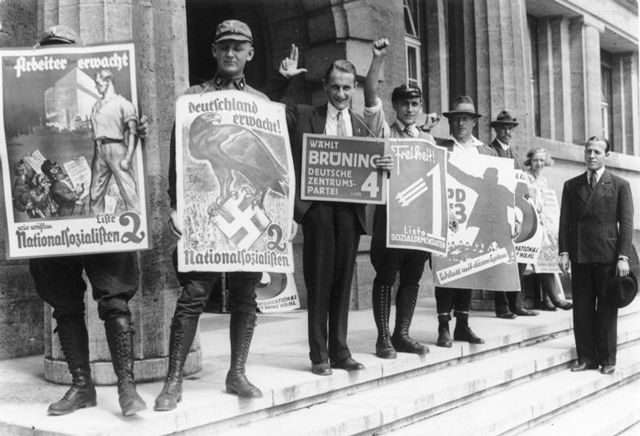Hitler’s dismantling of Weimar Germany led to a historical narrative portraying it as weak, flawed, politically unstable, and economically crisis-ridden.
Ingrained in popular and scholarly perceptions, this assessment emphasizes images of hyperinflation, street violence, and societal divisions.
However, it is imperative to reevaluate the Weimar Republic beyond these stereotypes, considering the complex interplay of political, economic, and social factors that shaped its tumultuous trajectory.
Also Read: Floods in Bosnia create new landmine risk
Rethinking Weimar Germany: A Nuanced Perspective
Reexamining the Weimar Republic challenges traditional views that label it as inherently doomed and unloved. This section delves into the historical intricacies, exploring how Weimar Germany emerged after the revolution and post-World War I disillusionment.
It investigates the Republic’s attempt to blend German political culture with mid-Atlantic parliamentary democracy and analyzes the successive crises, civil unrest, and societal fractures that defined its turbulent existence.
Legacy of the Treaty of Versailles Unraveling the Threads of Resentment
A pivotal aspect of the Weimar narrative is the profound impact of the Treaty of Versailles, whose harsh terms sowed seeds of bitterness, enabling right-wing politicians to shift blame for Germany’s challenges onto foreign powers.
This segment delves into the consequences of the Treaty and how it became a catalyst for societal fear and resentment, shaping the Republic’s trajectory and influencing current political narratives.
The Dual Image of Weimar Germany
Beyond its tarnished political and economic reputation, Weimar Germany holds a contrasting allure, particularly in the English-speaking world.
Scholars like Peter Gay and Walter Laqueur, along with Bob Fosse’s film Cabaret, shaped Weimar’s cultural narrative.
In British and American minds, Weimar Germany signifies wild nightlife, avant-garde art, and saucy cabaret.
Liza Minnelli’s Sally Bowles, Otto Dix’s art, and Kurt Weill’s music define Weimar’s vibrant culture.
The Enduring Allure Of ‘Divine Decadence’
The lasting appeal of Weimar Germany’s cultural image is evident in its continued influence on popular culture.
Despite journalistic warnings about the Republic being a ‘warning from history,’ adaptations of Christopher Isherwood’s experiences in Weimar Berlin, revivals of Cabaret on stage, a radio documentary on Weimar cabaret by Barry Humphries, and a dedicated festival on London’s South Bank in 2013 showcase the enduring fascination with this epoch’s artistic legacy.
However, even this perception of Weimar as a haven for art and experimentation carries a shadow of darkness. Behind the façade of ‘divine decadence,’ there lingers a sense that cultural vibrancy masked the republic’s underlying instability and hollowness, akin to worthless paper money or political violence.
Even sympathetic accounts acknowledge a fatalistic undertone, encapsulated in Peter Cook’s provocative claim that Berlin cabarets prevented the rise of Hitler and averting the Second World War.
Beyond the Stereotypes: A Reassessment of Weimar Germany
New research challenges Weimar’s prevailing pessimistic narratives, highlighting achievements overshadowed by negative stereotypes.
Beyond a doomed democratic experiment or hedonistic avant-garde hub, Weimar’s 15 years brought lasting achievements.
Despite revolution and political violence, Weimar saw constructive political participation and consensus often overlooked in historical narratives.
The Unrecognized Achievements: Social, Political, and Cultural Transformations
Weimar Germany, once seen as a failure, pioneered social reforms, sexual tolerance, and cultural experimentation.
Significant political reforms empowered women globally, shaping post-WWII societies.
Censorship’s end in the 1920s fueled an explosion of avant-garde ideas, art, and literature.
Weimar was a breeding ground for scientists and thinkers, reshaping perceptions and theoretical physics.
Not a mere footnote, Weimar’s complexity includes challenges and achievements shaping contemporary societies.
Weimar’s democracy’s demise resonates globally, yet its achievements must not be overshadowed.
Despite its end, Weimar’s positive features, beyond crises, deserve acknowledgment.
The republic’s intricate story, blending creation and destruction, demands remembrance in its full complexity.
A Period Of Contrasts Creation Amidst Destruction
With its complex and multi-faceted narrative, Weimar Germany was a chapter in German history characterized by both the best and worst facets of democratic politics.
It serves as a case study for understanding the dynamics of modern industrial societies when confronted with extreme conditions.
Beyond the shadows of crisis, the republic witnessed remarkable achievements, shaping social, cultural, and political landscapes.
Its story encourages a nuanced perspective, reminding us that historical periods are seldom defined by singular narratives but are rather a tapestry of contrasting elements.
Learning From Weimar: Insights For Our Times
The study of Weimar Germany provides valuable insights into contemporary times.
Lessons from Weimar: Democracy’s strengths and vulnerabilities, societal impacts under extreme conditions, and enduring cultural-political experimentation.
Weimar’s legacy underscores the importance of understanding the complex past to navigate contemporary challenges.

Colin Storer is a Lecturer in History at the University of Nottingham and is the author of A Short History of the Weimar Republic, the latest in our Short Histories series.
Visit short-histories.com for more information about the series.


